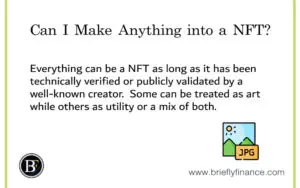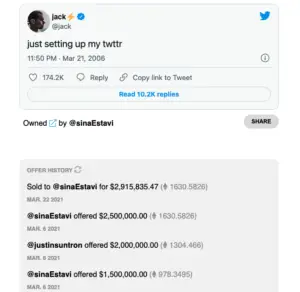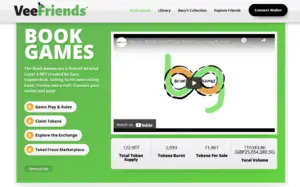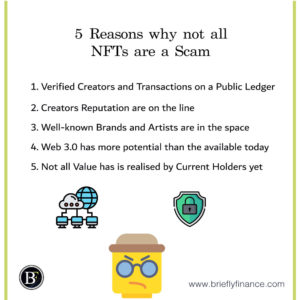Anyone can take a screenshot or copy and paste NFTs. This argument will stay around until people realise what NFT really is. To keep it short, NFTs provide the holders the distinction of owning the original collectible version of a media file and/or benefit from its utility. But the question is now can anything be turned into an NFT?
Everything can be a NFT as long as it has been technically verified or publicly validated by a well-known creator. Some can be treated as art while others as utility or a mix of both.
Through a smart contract, the blockchain sends verifiable tokens with metadata which includes unique IDs for NFTs providing the buyers with access the media file and utility.
For example, let us assume that McDonald’s decide to make a NFT JPEG of a Big Mac. This NFT provides a lifetime discount for holders buying big Mac meals in any McDonald’s worldwide. Such NFT will have both the digital asset to use the sandwich as a picture as well as utility of discount on interacting with all point of sales devices worldwide.

Attribution: The icons has been designed using resources from Flaticon.com
What can be a NFT?
Digital Assets
Digital assets will be content created online, whether it is a picture, video, a book, or even a program that has code in it to offer user benefits.
Ok, the collectible authenticity aspect should be clear by now. Let us discuss the technology a bit. Here is an example that I believe that it could happen in the future:
Let us say a university decided to issue a certificate for their students as NFTs. This certificate will have metadata that can’t be changed (immutable) which will include the graduated student name, the unique ID code, time stamp, and also the official smart contract of this university. Now the certificate holder can use that NFT in anywhere and employers do not have to question the originality of this certificate.
On the other hand, a famous artist or person could disclose publicly his contact code and the ID of items he is selling which means they will know that it is valuable and verified by a trusted person. Here is an example, Jack Dorsey the CEO of Twitter have sold the first tweet ever which was for 2.9 million after a big auction. This digital NFT would have no value if he didn’t the public about it and where they can get it from.

Source: https://v.cent.co/tweet/20
Physical Assets
Alfa Romeo’s NFT
Alfa Romeo have used NFT for their new Alfa Romeo Tonale car as a way to store the car data. Each car will have exclusive NFT storing information like with NFT that stores the car like how many miles it moved and its maintenance sessions. Such information will help in the transparency for the owner of the car when they are interested to sell it out. Below is a video from George Downs | WSJ about the topic.
Book Games by Vee Friends
Another example showing that NFTs are not necessarily a way for buying one-to-one to physical assets. Some projects like Gary Vee’s Book Games, rewarded users who bought 12 copies of his book Twelve and a Half which in return buyer gets a NFT.
It is a gamified experience for the holders by providing them utility with these NFTs that can be treated as a pass for the next Vee Friends Series 2 (to attend conferences and much more).

Source: https://veefriends.com/book-games
Physical assets can be connected to NFTs whether through a trusting a person/brand or through connecting to a physical item through the network.
I personally believe if this technology becomes mainstream, many of our personal/legal documentation like our IDs, properties, and contacts will also be treated as NFTs.
If Anyone can Create NFTs, how to Deal with Legal Challenges?
Because this sector is still not fully regulated yet, there is always potential for scams and even miss use of other peoples’ ownership rights by making them as NFTs.
Such conditions also are the reason why people say that NFT space is a scam (if you want to know more about this topic I have made a post about it in the link)

Attribution: The icons has been designed using resources from Flaticon.com
As far as I know there is still no way to stop any illegal activities in the space, however it can be mitigated through:
1- Buyers proper in-depth research, and
2- Marketplace proper fraud detection.
Buyers Responsibility
As a user to deal with this space should always make sure that the NFT you buy is legit. Make sure the project owners have track record, and check are they publicly present or did they hide their identity?
If you decide to buy a NFT that is related to a brand. Just double check their official sources, did they discuss the NFT project or are there scammers try to use their name?
Marketplaces Responsibility
As in marketplace, part of the responsibility is to supervise and regulate the website they list the NFTs on.
They should stop copycat projects and remove the collections from being listed to reduce the potential risk on their user base.
Final Thoughts
NFT has opened so much possibilities for creators to do various of innovations with this technology. Smart contracts capability made it really expendable in many different areas.
I am not sure where NFT will primarily move, whether it is in the collectibles side, or utility who knows what could happen with this powerful technology. Who knows maybe in the future we will hold a single ID NFT that will have our access to our house, bank account, and health data connected to all devices around us!
Related Posts:
- Is NFT a Bubble? Bullish and Bearish Point of Views
- Are NFTs a Pyramid Scheme? 4 Reasons Why it Feels Like it
- What is the Metaverse and why you should care?
Disclaimer: Above links are affiliate links and at no additional cost to you. I may earn a commission. Know that I only recommend products, tools, services and learning resources I’ve personally used and believe are genuinely helpful and relevant. It is not because of the small commissions I make if you decide to purchase them. Most of all, I would never advocate for buying something that you can’t afford or that you’re not yet ready to implement.
